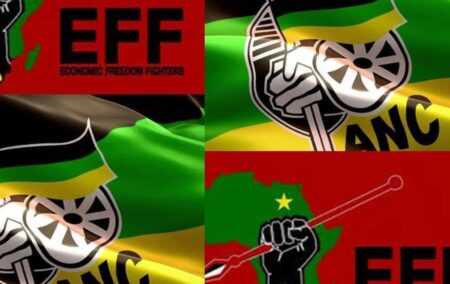The real question that arises over possible post-election coalition arrangements “is whether South Africa’s people will rally to defend themselves”.
So writes IRR analyst Terence Corrigan in the Institute’s latest report, A Question of Fate: An ANC-EFF coalition in 2024?
Corrigan observes in the conclusion of the report: “South Africa is fortunate that it does have the potential for significant resilience and resistance to these risks: a free society (at times anarchically so), a diverse media, a vibrant civil society, and a respected judiciary. Perhaps the question is whether South Africa’s people will rally to defend themselves.
“‘There is no fate but what we make for ourselves.’ So goes a line from the long-running science fiction Terminator franchise. As South Africa approaches a landmark election, it is a timely piece of advice.”
A Question of Fate suggests that an ANC-EFF coalition would likely follow a populist pattern, based on an examination of the respective ideological underpinnings and manifestos of the two parties.
The implications would be profoundly important for the country.
The paper speculates that an ANC-EFF coalition would attempt rapidly to expand welfare and redistribution, while simultaneously circumventing the constitutional and institutional limits currently in place. This would likely come with an aggressive narrative of combating supposed enemies.
Such strategies have in other contexts often been motivated by severe socio-economic stresses and the failure of confidence in existing institutions. These conditions certainly exist in contemporary South Africa, driven in large part by choices that have consciously been made by political actors. Indeed, elements of the populist agenda have already been enacted.
Experience of this sort of political strategy elsewhere has invariably proved deleterious. After a brief period in which it appears to be working, the room for economic manoeuvre shrinks and the unsustainability of the strategy becomes manifest. Attempts to correct these failures are expressed in attacks on institutions intended to hold governments to account.
Corrigan concludes: “South Africa’s history has gone through numerous instances in which the odds of prevailing circumstances and the choices of political actors defied expectations. It is not impossible that an ANC-EFF coalition could do likewise.
“But on the available evidence, this is difficult to imagine. Neither party has over the past decade demonstrated a reassuring commitment to probity in governance, or to prudence in politics, and while credit should be given to the ANC for having not lurched in a fiscally populist direction thus far, the cumulative effect of economic choices made has pushed South Africa to a point where that would be appealing.”
Noting the importance of “the experiences of democratic decline and populist insurgencies elsewhere”, Corrigan cautions: “It is a salutary reminder of the course that history can take that countries like Venezuela and Zimbabwe were once regarded as stable and prosperous, and as democracies, albeit imperfect ones.”
*The report was launched on Monday with an online discussion between Corrigan and Nicholas Lorimer, which you can watch here: https://youtu.be/whmkTpcZ5Pg

